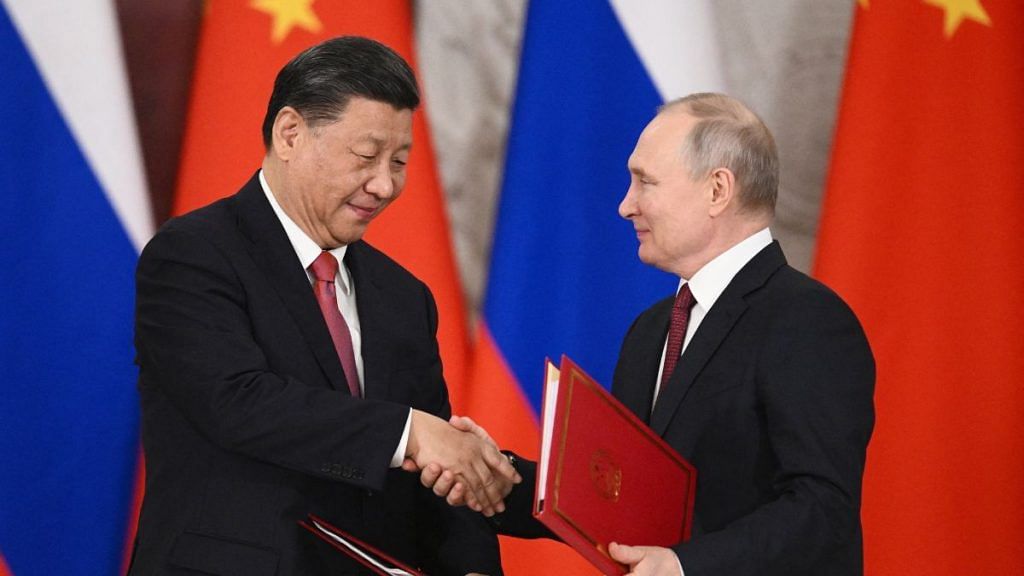New Delhi: Chinese President Xi Jinping and his Russian counterpart Vladimir Putin Wednesday signed a joint statement in which they called for strengthening coordination on the Russia-India-China (RIC) trilateral, expressed concern about NATO’s military ties with Asian-Pacific countries, and vowed to deepen energy cooperation with one another.
Titled ‘Deepening the Comprehensive Strategic Partnership of Coordination for the New Era‘, the joint statement outlines nine pillars of cooperation between Beijing and Moscow, ranging from energy cooperation to nuclear non-proliferation.
On the Ukraine issue, the Russian side appears to have endorsed China’s proposed peace plan to resolve the conflict. “The Russian side welcomes China’s willingness to play a positive role for the political and diplomatic settlement of the Ukraine crisis and welcomes constructive proposals,” read the statement issued during Xi’s state visit to Moscow.
In February, Beijing had released a 12-point peace plan in which it called for a ceasefire and cessation of hostilities in Ukraine, while also urging countries to abandon their “Cold War mentality” in an apparent reference to NATO member states.
Referring to the war in Ukraine, the Russia-China joint statement said, “The two sides point out that to settle the Ukraine crisis, the legitimate security concerns of all countries must be respected, bloc confrontation should be prevented and fanning the flames avoided.”
It added that the two countries oppose any future sanctions that are not authorised by the UN Security Council.
The statement comes more than a year after leaders of the two countries signed their “no limits partnership” during Putin’s visit to Beijing for the Winter Olympics, just 20 days before Russia invaded Ukraine.
‘Priority partners’
In the joint statement, China and Russia identified one another as “priority partners” on the international stage.
“The two sides pointed out that China-Russia relations are not a military-political alliance similar to the Cold War era, but go beyond this model of state-to-state relations and have the nature of non-alignment, non-confrontation and non-targeting of third countries,” it stated.
The two sides also vowed to “firmly” support each other when it comes to territorial integrity. For instance, on Taiwan, Russia reaffirmed its backing of the ‘One-China’ principle and opposed any form of “Taiwan independence”.
Both also pledged to organise regular joint maritime and air cruises to deepen mutual military trust.
Trade & energy cooperation
The Chinese and Russian presidents vowed to deepen cooperation on trade, investment and energy. The commitment comes in the backdrop of countless Western companies having pulled their investments from or halting their business operations in Russia. The European Council estimates that in 2022, Russia’s GDP dropped by 2.2 per cent “in the best-case scenario and by up to 3.9 per cent in the worst-case scenario”.
In the joint statement, however, China and Russia agreed to expand the use of local currencies in bilateral trade, investment and other economic activities.
They also vowed to continue working towards an investment treaty known as the ‘China-Russia Investment Cooperation Plan’ which is expected to help create new growth areas for investment cooperation. On energy, the two sides agreed to advance projects in oil and gas, coal, electricity and nuclear energy.
They also called on the need to safeguard critical cross-border infrastructure, while stressing on an independent investigation of the Nord Stream pipeline bombings that took place in September 2022. “An objective, impartial and professional investigation of the explosion of the “Nord Stream” pipeline should be conducted,” read the statement.
Coordination in multilateral forums
Xi and Putin also agreed to enhance cooperation at multilateral forums such as the Shanghai Cooperation Organisation (SCO), BRICS, UN, G20 and the World Trade Organisation (WTO). Trialterals such as the China-Russia-India (RIC), a strategic grouping that took shape in the late 1990s, were also briefly mentioned.
“The two sides will strengthen coordination on China-Russia-India, China-Russia-Mongolia, as well as platforms such as the East Asia Summit…,” read the joint statement.
It added that Russia and China condemn attempts to politicise and “cram extraneous issues” into the agenda of certain multilateral platforms.
This comes weeks after the G20 Foreign Ministers’ Meeting failed to culminate into a joint communique, with India, in its chair summary, pointing out that China and Russia opposed certain sections that had mentioned Ukraine.
Nuclear non-proliferation
Contrary to statements he made in the past that were interpreted as threats to use nuclear weapons in Ukraine, Putin, in the joint statement, reaffirmed his support for the international Treaty on the Non-Proliferation of Nuclear Weapons (NPT).
However, both Beijing and Moscow criticised the submarine deal struck by members of AUKUS — UK, US and Australia — wherein the US is expected to supply nuclear-powered submarines to Australia.
“The two sides expressed serious concern about the consequences and risks to regional strategic stability of the Trilateral Security Partnership (AUKUS) established by the United States, the United Kingdom, and Australia and related nuclear-powered submarine cooperation plans,” read the joint statement.
Weeks after China helped broker an agreement between Saudi Arabia and Iran, the joint statement from Xi and Putin explicitly voiced support for maintaining peace and stability in the Middle East, to resolve “hotspot issues” through dialogue and opposed interference in the internal affairs of regional countries.
(Edited by Amrtansh Arora)
Also Read: Arrest warrant against Putin: What is ICC & why India didn’t sign Rome Statute
